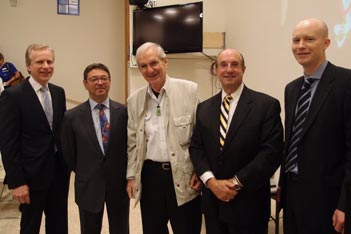Crossgrove Lecture: Stress,
Burnout and Personal
Wellness among North
American Surgeons
|
If all the world is a stage, then Charles Balch has
played every starring role in the theatre of surgical
oncology. The topic he will address today: stress,
burnout, personal wellness tugs at our very being
and affects us all in one way or another as we skip
and waddle through our lives.
His surgical career began at the University of
Alabama in the nascent role of a surgical oncologist.
One that included a basic science immunology lab,
aided by a fellowship at the Scripps Clinic during
residency, and randomized clinical trials in breast
surgery. His collaborative health outcomes research
with the Sydney Australia Melanoma Unit, formed
the foundation of our current knowledge on prognostic
factors for melanoma and the AJCC/UICC
staging of melanoma.
I was lucky enough to join Charles as a first year fellow
in the mid 80’s during his first year after recruitment
to MD Anderson Cancer Center as Chair of the
Department of Surgical Oncology. Soon, he ascended
the surgical ladder from Division and Department
Chief to Executive Vice President for Health Affairs.
He has been President of the Society of Surgical
Oncology and was the founding editor of its journal
– the Annals of Surgical Oncology.
After serving in the CEO roles at City of Hope
National Medical Center and ASCO, he settled
down at Johns Hopkins until 2011 when he moved
to University of Texas South Western Medical
School. All the while, he was consistently devoted
to his wife Carol and his family.
David McCready
|

left to right: David McCready, Lorne Rotstein, MM, Charles Balch and Alan Okrainec
Charles Balch began his Grand Rounds by saying
“Although Grand Rounds usually focuses on a particular
patient, for the next 60 minutes, you are the patient.”
He then delivered a riveting lecture on burnout among
surgeons with this challenge: “Burnout is widely prevalent,
preventable, and treatable disease that affects a
surprisingly high number of surgeons. It is defined as
physical or mental collapse caused by overwork.” In his
survey of members of the American College of Surgeons
40% suffered from symptoms of burnout.
Burnout differs from the global impairment of depression,
which affects all aspects of an individual’s life.
“Burnout can affect both physicians’ satisfaction with
their work and the quality of care that they provide. It
is characterized by emotional exhaustion, lack of interest
and enthusiasm for work, physical exhaustion, depersonalization
and a decreased sense of personal accomplishment.
All of these lead to various levels of ineffectiveness.
The extreme consequences of stress and burnout include
drug and alcohol addictions, sleep disturbance, fatigue,
broken relations, including divorce, chronic diseases,
early retirement, depression, suicidal ideation, or suicide.
The characteristic personality of the physicians that
makes them vulnerable to burnout is their thoroughness,
commitment to patients and sense of responsibility and
patient trust. When maladapted to these conditions,
physicians develop difficulty relaxing, have problems
allocating time for their family. They sense responsibilities
beyond what they can control, feel they are not
doing enough, have difficulty setting limits, and confuse
health self-interest with selfishness. The potential contributing
causes include the length of training, the delay
in gratification for the sacrifices made during training,
the lack of realization, or fulfillment of expectations,
once the goal is reached, financial issues, limited control
over the delivery of medical service, grief and guilt about
patient loss or unsatisfactory outcomes, insufficient protected
time, long working hours, enormous workloads,
feelings of isolation, a hostile workplace environment,
lack of autonomy or decision involvement, and imbalance
between career and family.”
|
In a large survey of American College of Surgeons
members, Balch et al. found that 40% of respondents fit
the criteria for burnout and 30% screened positive for
depression (1, 2).
Substance abuse is a significant outcome of burnout.
The prevalence of alcohol abuse, or dependence
in male surgeons was 13.8%, and for female surgeons
25.4%. Surveys of physicians in general conducted by
the American Medical Association find similar levels of
burnout and depression among physicians in general.
Among the most salient remedies was an emphasis on
time away from work that is more than simply a chance
to rest for another workday. Caring for oneself, cultivating
relationships, and nurturing personal interests
provides the opportunity for achievement and personal
growth outside of work.
The top 10 differences among surgeons not burned
out and those who are summarized nearby. Having
mentors and being a mentor is an important source of
value, balance, and personal satisfaction throughout a
professional career.
M.M.
REFERENCES
1. Shanafelt TD, Balch CM, Bechamps G, Russell T, Dyrbye
L, Satele D, Collicott P, Novotny PJ, Sloan J, Freischlag J.
Burnout and Medical Errors among American Surgeons.
Annals of Surgery, 2010, Vol. 251: 995-1000
2. Balch CM, Shanafelt TD, Sloan JA, Satele DV, Freischlag
JA. Distress and Career Satisfaction among 14 Surgical
Specialties, Comparing Academic and Private Practice
Settings; Annals of Surgery, 2011 Oct; 254(4):558-68
|